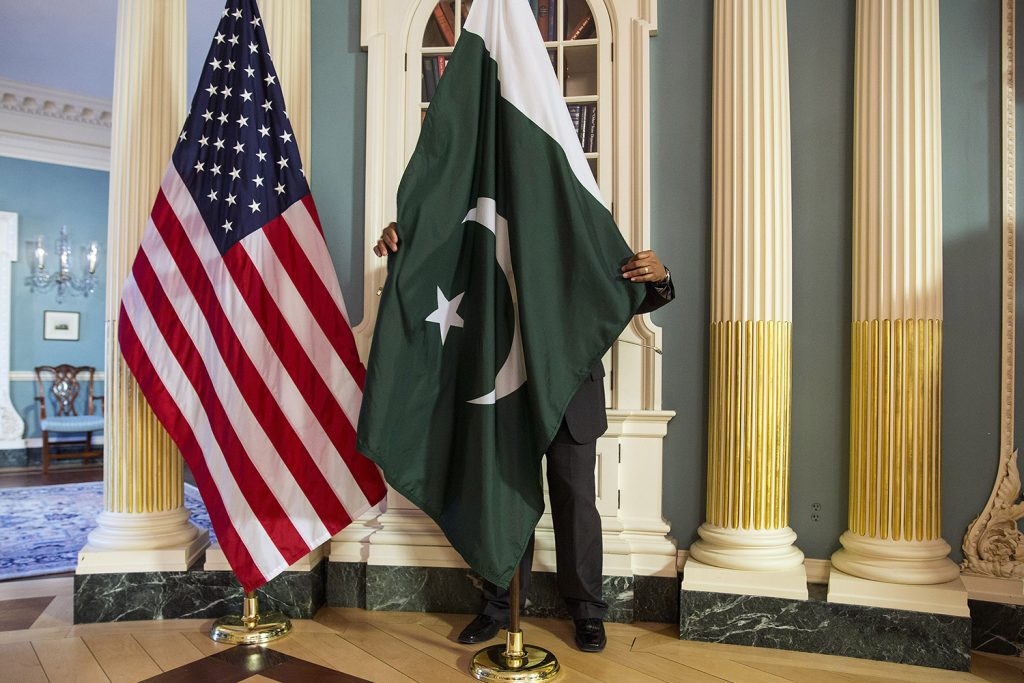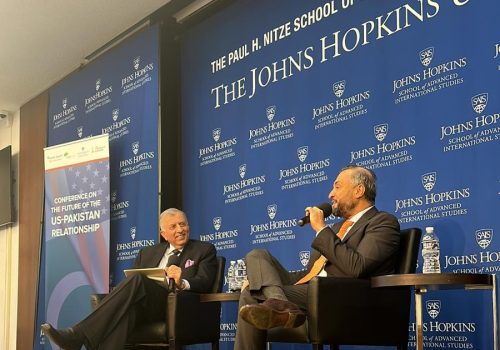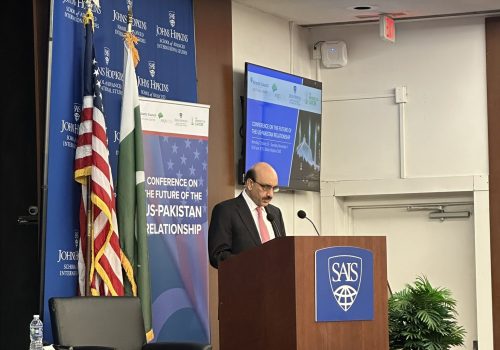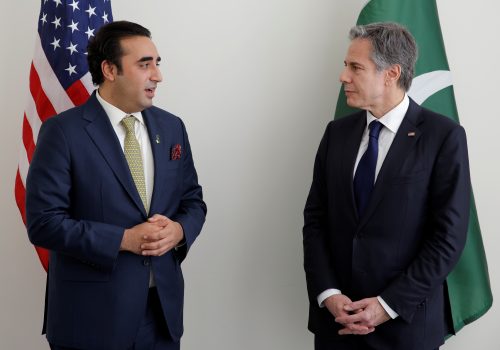Top ten takeaways from the 2022 Conference on the Future of the US-Pakistan Relationship
On October 31 and November 1, 2022, in partnership with the Engro Corporation, the University of Lahore, and the Johns Hopkins University School of Advanced International Studies, the Atlantic Council’s South Asia Center hosted a Conference on the Future of the US-Pakistan Relationship.
In case you missed it, you can view the panels here and read up on the top ten takeaways below.
The bilateral relationship must navigate three strategic challenges: Economics, the legacy of the war in Afghanistan, and emerging partnerships.
Finance and trade are at the core of Pakistan’s strategic challenges. In that sense, Pakistan recognizes that economic success is central to dealing with both human and traditional security needs of the country.
In terms of the legacy of the war in Afghanistan, challenges surrounding counter-terrorism continue to be areas of concern, and potential cooperation moving forward.
Lastly, emerging partnerships and their interactive effects pose critical challenges to the bilateral relationship.
It is important for Pakistan to have long-term foreign policy priorities that do not get impacted by political volatility in the country.
The top priority for Pakistan should be centered around building relationships and alliances to bolster its economy, improve human security, and mitigate against emerging challenges like the climate crisis.
To deal with these issues, it is important for Pakistan to partner with other countries that are, for example, taking the lead on the climate crisis.
Pakistan’s national security policy is anchored in economic security and building out trade and economic relations. Pakistan should evolve into a transit hub for regional countries and continue trade and development activities not only within Pakistan but throughout Afghanistan, Central Asia, and regions beyond its immediate neighborhood.
Lastly, there is a growing recognition that if there is no peace and stability in the region, Pakistan will not be able to enhance its economic security.
Given these priorities, Pakistan’s interests align with the United States since Washington is also committed to ensuring peace and stability in the region.
The biggest barrier to technological growth is good governance and an overregulated environment.
While the technology ecosystem continues to grow, governance challenges undermine the innovative potential of the market. Pakistan needs a stable macro-environment (policy certainty and rule of law is critical to achieving this) to establish an enabling environment that allows innovative firms to scale. This is a core challenge on the export side as well, considering Pakistan’s risk perception, supporting infrastructure weaknesses, human capital needs, and broader instability.
The fintech industry has blossomed in Pakistan due to the government’s implementation of progressive regulations.
The government has started to recognize that access to finance allows access to mortgages, asset finance, credit, and loans. This access is especially integral for rural households, where there is strong potential for establishing credit history and thereby unlocking more access to credit.
Investors recognize that there is a “Golden Triangle” that makes up the enabling environment for startups. The most important sector to invest in is the fintech sector because it is what enables formalization of the economy.
A more progressive approach to the regulatory framework is exciting innovators, who now see Pakistan in a way they viewed Indonesia ten years ago.
The formalization of the economy, catalyzed by access to modern finance, is going to generate significant economic growth moving forward.
The United States does not have a concrete US-Pakistan policy.
It is understood that Pakistan does have strategic importance, but it fails to get the proper attention it deserves from the United States in sectors other than traditional security.
One may argue this is due to the fact that its neighbors—Iran, China, and Afghanistan—are largely off-limits with the United States, and cooperation with its other neighbor, India, is unlikely. In order to attract the proper attention from the United States in the current geopolitical context, Pakistan must also adopt a more nimble approach to its foreign policy.
At the same time, it is important for Washington to pay more attention towards developing a robust policy in terms of developing the broad contours of a bilateral relationship.
Investments in climate-smart agriculture are the need of the hour.
Agriculture represents almost 20 percent of Pakistan’s gross domestic product (GDP) and employs almost 40 percent of Pakistan’s labor force. The future of agriculture in Pakistan needs to reflect and adapt to the current challenges the country is facing.
Innovation in this sector is a major area of potential collaboration between the United States and Pakistan. This collaboration should be led by the private sector and needs to be inclusive. If executed correctly, this modernization in the agriculture sector has the potential to promote inclusivity, increase access to markets and services, enhance food security, and bolster the bilateral relationship.
Pakistan’s potential in agriculture has been discussed for thirty years or more but action must be taken to attract private sector investment.
Policymakers need to take action to encourage engagement from the private sector in Pakistan’s agriculture economy. This can be done through the following ten reforms:
- Pakistan should remove distortionary policies (ex. Public Wheat Procurement Program). These distortionary policies are no longer necessary.
- Pakistan must improve access to finance and develop financial legislation (ex. electronic warehouse receipts, inventory credit, etc).
- Pakistan should invest in human development and develop human skillsets.
- Pakistan should promote producer organizations (co-ops, farmer enterprise groups, etc).
- Pakistan needs to completely revamp the agricultural research and extension system. No country has developed its agriculture sector without spending a significant amount of money.
- Seed policy and intellectual property rights related to seeds should be reformed and standardized on the federal level.
- There is an urgent need to reform the water sector. For example, controlling the unlimited and unregulated extraction of groundwater and the registration and licensing of tube wells.
- Pakistan needs to develop an agricultural insurance system. Most countries have this, and efforts have been started in Punjab, but need to be expanded.
- Land tenure governance needs to be improved, including land taxation, land registration, and land titling. Land tenure security is critical for private investment.
- Pakistan needs to improve its public governance, address corruption, and promote transparency.
There are many opportunities for US private sector investment in Pakistan.
US and foreign investors need to know that Pakistan is open for business. Most investors look to Pakistan because they are interested in investing in a developing market, but the three major concerns from foreign investors in Pakistan are ease of doing business, security, and currency stability.
Security has recently been the least of foreign investor’s worries. Currency stability and devaluation are significant concerns, and ease of doing business (in terms of Pakistan’s taxation policies, repatriation of dividends, and provincial and federal laws) is also very important to investors.
Finally, economic stability is more important to foreign investors than political stability, due to the fact that countries all across the globe are facing political instability.
Climate change is a global issue, and Pakistan—let alone South Asia—cannot prevail alone.
There is no such thing as regional cooperation to combat climate change. It is global in nature, and actions taken by just Pakistan and the region will not stop climate change. Climate change requires globally centered solutions. It is necessary to work together, knowing and understanding that we will surpass 1.5 degrees, and not half emissions by 2025.
Working together on climate change could lay a framework for other areas of cooperation moving forward. With private sector investment, it is important to readjust investor expectations and understand that they will not make the same return on investment by investing in adaptation.
The narrative around global climate change needs to be written around water and heat—not just carbon.
Water and heat are less abstract, but we can see the impact they are having, i.e., it is killing people. Disaster from water and heat such as floods, heat waves, droughts, and so on, are impacting the poorest citizens the most. When the narrative is around tangible things such as water and heat, the solutions lie at the local level through adaptations and nature-based solutions. As such, money needs to be invested in communities.
To be better prepared for this crisis, Pakistan needs to improve its local government systems, as local communities are not only at the forefront of the climate catastrophe but they are also best equipped to make the investments necessary to be better prepared to deal with this threat.

The South Asia Center is the hub for the Atlantic Council’s analysis of the political, social, geographical, and cultural diversity of the region. At the intersection of South Asia and its geopolitics, SAC cultivates dialogue to shape policy and forge ties between the region and the global community.



